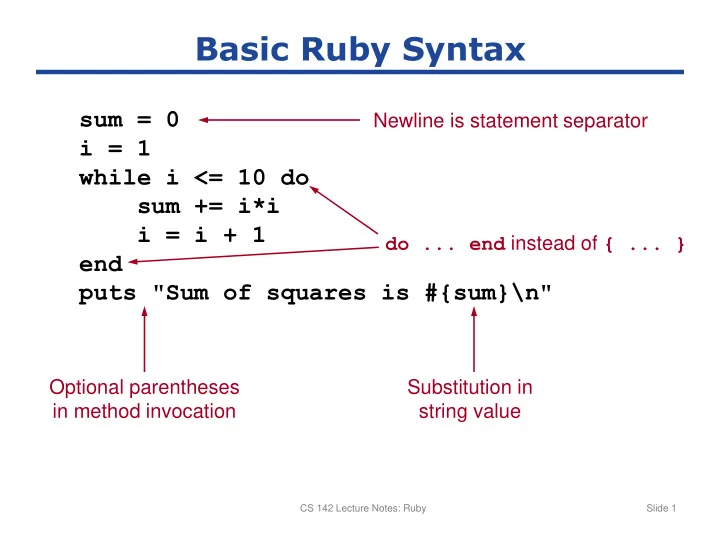

Basic Ruby Syntax sum = 0 Newline is statement separator i = 1 while i <= 10 do sum += i*i i = i + 1 do ... end instead of { ... } end puts "Sum of squares is #{sum}\n" Optional parentheses Substitution in in method invocation string value CS 142 Lecture Notes: Ruby Slide 1
Ruby String Syntax ● Single quotes (only \' and \\ ) 'Bill\'s "personal" book' ● Double quotes (many escape sequences) "Found #{count} errors\nAborting job\n" ● %q (similar to single quotes) %q<Nesting works: <b>Hello</b>> ● %Q (similar to double quotes) %Q|She said "#{greeting}"\n| ● Here documents <<END First line Second line END November 21, 2011 @ExploreNY Slide 2
Variable Names and Scopes foo Local variable $foo Global variable @foo Instance variable in object @@foo Class variable “Constant” (by convention) MAX_USERS CS 142 Lecture Notes: Ruby Slide 3
Ruby Statements if x < 10 then ... elsif x < 20 ... else ... end while x < 10 do ... end array = [14, 22, 34, 46, 92] for value in array do ... end CS 142 Lecture Notes: Ruby Slide 4
Factorial def fac(x) if x <= 0 then return 1 end return x*fac(x-1) end CS 142 Lecture Notes: Ruby Slide 5
Arguments: Defaults, Variable # def inc(value, amount=1) value+amount end def max(first, *rest) max = first for x in rest do if (x > max) then max = x end end return max end CS 142 Lecture Notes: Ruby Slide 6
Keyword Arguments def create_widget(size, properties) ... end create_widget(6, {:id => "table22", :class => "Cart"}) create_widget(6, :id => "table22", :class => "Cart") create_widget(6, id: "table22", class: "Cart") CS 142 Lecture Notes: Ruby Slide 7
Blocks, Iterators, Yield oddNumbers(3) do |i| Block: code passed print(i, "\n") to method end def oddNumbers(count) number = 1 while count > 0 do yield(number) Invoke method’s block number += 2 count -= 1 end end CS 142 Lecture Notes: Ruby Slide 8
Another Block/Iterator Example def sumOdd(count) sum = 0 oddNumbers(count) do |i| sum += i end return sum end def oddNumbers(count) number = 1 while count > 0 do yield(number) number += 2 count -= 1 end end CS 142 Lecture Notes: Ruby Slide 9
Equivalent Code array = [14, 22, 34, 46, 92] for value in array do print(value, "\n") end array = [14, 22, 34, 46, 92]; array.each do |value| print(value, "\n") end CS 142 Lecture Notes: Ruby Slide 10
Simple Class class Point def initialize(x, y) @x = x @y = y end p = Point.new(3,4) puts "p.x is #{p.x}" def x p.x = 44 @x end def x=(value) @x = value end end Slide 11 CS 142 Lecture Notes: Ruby
Module Example class MyClass include Enumerable ... def each ... end end New methods available in MyClass: min , max , sort , map , select , ... CS 142 Lecture Notes: Ruby Slide 12
CS 140 Lecture Notes: File Systems Slide 13
Recommend
More recommend